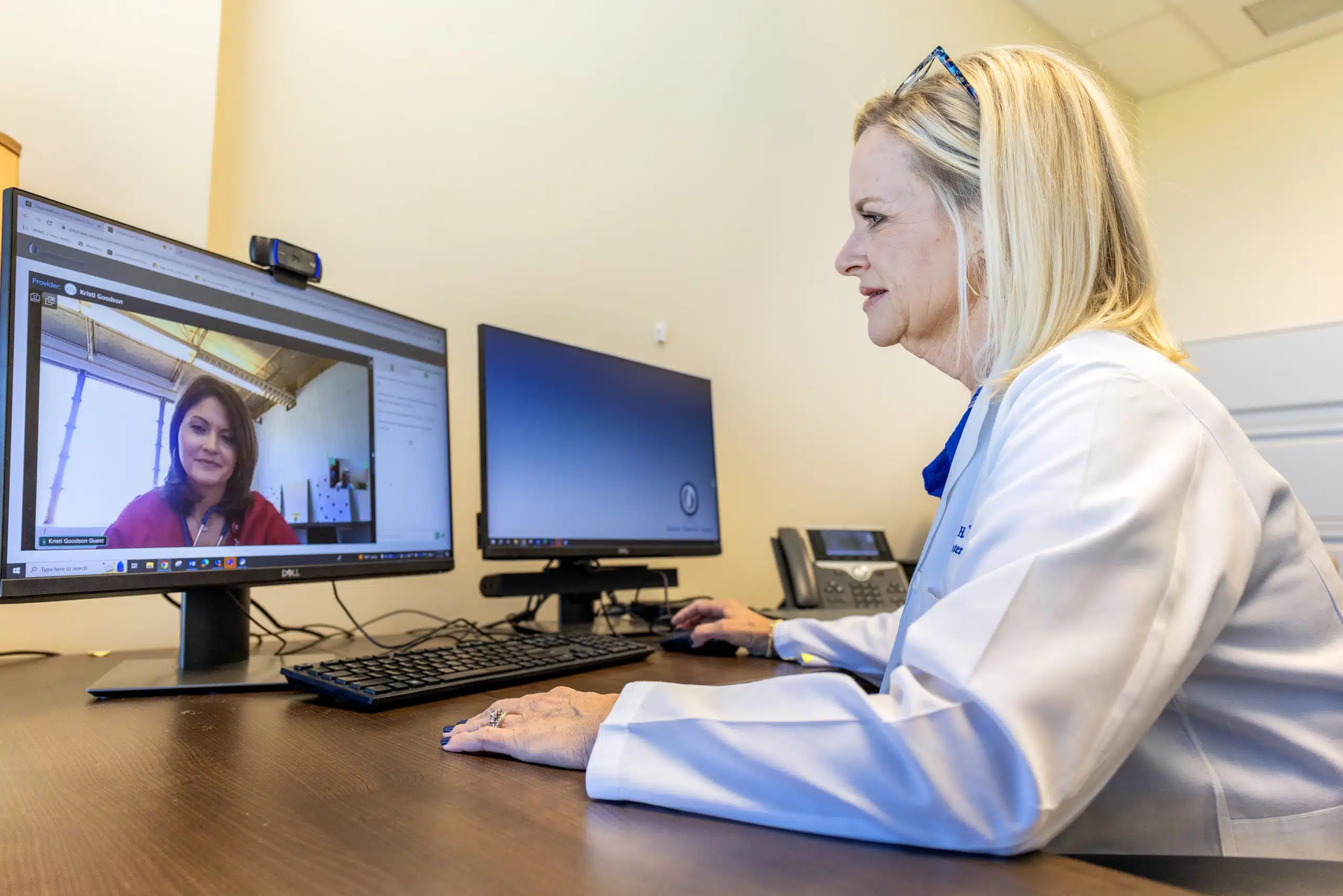Mississippi Today
Few schools utilizing telehealth program, but administrators hope to ramp up

Most school districts only used the state’s new telehealth program a few times in the 2022-23 school year, but program administrators say they are working to increase participation and have already seen positive results.
The school-based telehealth program was created by the Mississippi Department of Education, which gave $17.6 million of pandemic relief money to the University of Mississippi Medical Center to administer the program. The grant, which expires in Sept. 2024, covers laptops for video conferencing, rapid strep and flu tests, and specially equipped stethoscopes and otoscopes that transmit information to the doctors or nurse practitioners on the other end of the call.
The program, which is free to students, began under the direction of former State Superintendent Carey Wright, with the goal of increasing access to medical care and keeping children in school more hours each day. Over half of the counties in Mississippi have no practicing pediatricians according to the Office of Mississippi Physician Workforce, something this program aims to help address by decreasing the amount of time families spend traveling to access care.
The program was open to all 145 school districts in the state, and 100 signed up. Of those 100, data from UMMC shows only 34 districts had at least one visit in the 2022-23 school year. However, some visits were not assigned to a school district, making it possible that more participated.
Dr. Saurabh Chandra, the hospital’s chief telehealth officer, said he is very proud of the speed at which his team has been able to successfully roll out the telehealth program. This is the largest school-based telehealth program in the country he is aware of, adding it was implemented faster than many others. While he was pleased that connectivity did not end up being a major issue, he said the shortage of school nurses has been a challenge.
After spending the first year focused on implementation, Chandra said the goal is now increasing participation. He said nurse educators are communicating regularly with school districts to understand their concerns. UMMC has already made at least one change – allowing school nurses to call and schedule an appointment instead of doing it in the computer software – based on the feedback.
The outreach already seems to be helping: the program averaged about 150-170 visits a month last year, but August and September of this year have seen about 275 visits each month.
“(The program) is in a stage of infancy,” he said. “You have to implement the program, you have to understand the barriers, you have to do the engagement, this is a continuous work, but we are seeing good trends.”
Lauren Hunt, the nurse at Stone County Elementary School, is a regular user of the program. Stone County does not have any practicing pediatricians, but there are several in neighboring coast counties, according to the physician workforce data.
Hunt brings up the service to parents when she thinks a student could benefit and said she has had very few parents refuse. She said she “has not been able to brag on it enough” and expressed a desire for more school nurses to start using it so it can be a greater benefit to the state.
“The school nurse is really the keyholder – she is the one that has to want to implement it and use it,” Hunt said.
She also emphasized the importance of outreach to parents so they’re aware they can request visits and don’t automatically take their children to the doctor on their own. Hunt said she has seen this be effective in action, particularly for children without health insurance who have used it for ear infections and other small issues.
Parent outreach is also a priority for UMMC, but Chandra said his team depends on school districts to spread the word. He hopes as parent awareness of the program increases, their trust in it will rise as well leading to increased participation.
Jana Miller is one of two nurses covering five rural schools in the Greene County School District. Her favorite part of the program is the convenience: appointments are usually available within 30 minutes, and students are not required to check out and wait to be seen, saving parents time as well.
Miller said her district has also utilized the teletherapy portion of the program, which provides mental health services to children. The school identifies students for it based on parental requests, school staff’s knowledge of difficult circumstances, or a child reaching out for someone to talk to. She also schedules these appointments but does not participate in them like the telehealth visits.
“I was really apprehensive (of the telehealth program) at first because I just didn’t know how it was going to work, but I’m very glad we took the leap of faith and went through with it,” she said.
One district hopes to use the program more now that technical issues have been resolved. There are no pediatricians in Chickasaw County, where nurse Dawn Vance works in the schools.
“I think with a little push, maybe the nurses get a little more training and the IT stuff gets all worked out, I think it would really pick up, especially in an area like ours where there’s not many options,” she said.
Other districts have said they don’t have as much of a need for the program because of existing school-based clinics or parent preference for local pediatricians.
Hunt, the Stone Elementary School nurse, said she hopes more schools start using it so the state will have an incentive to keep funding the program after the federal pandemic relief money expires.
UMMC is looking for other grants to continue funding the project or considering turning it into a program that takes insurance, Chandra said.
“We know that there’s a need for it out there,” said Scott Clements, director of healthy schools for the Mississippi Department of Education. “We have a lot of rural areas … and in those rural areas you oftentimes don’t have the services you have in a metropolitan area.”
This article first appeared on Mississippi Today and is republished here under a Creative Commons license.
Did you miss our previous article…
https://www.biloxinewsevents.com/?p=291125
Mississippi Today
West Jackson youth find respite and gain skills at Stewpot summer camp
Laughter erupts from the kitchen of Stewpot’s Teen Center as rising sixth grader Jamila Jeffries cuts a raw potato into thin slices. It’s lunch time, and she’s surrounded by other campers who are busy digging into french fries and stuffed-crust pizza.
Jeffries is taking part in the recreational summer camp, and though it’s her first day, she said she’s already making friends.
“ I like how we get to cook and stuff. We get to learn about each other. We get to do new things every day,” Jeffries said.
Stewpot Community Services is one of Jackson’s main meal kitchens and provider of shelters for people experiencing homelessness. Jeffries is one of about 150 children who are here for the summer camp, and she said spending time at Stewpot allows her the chance to do something other than being at home.
“ It gives me time to breathe,” she said. “I get to relax and I don’t have to worry about anything happening here. I get to cook stuff. I get to enjoy myself.”
Yolanda Kirkland, Stewpot’s director of teen services, said that’s the point. She hopes to cultivate a welcoming environment where her campers can be comfortable.
“ It’s very important that people have places of rest,” Kirkland said. “I think when they’re in a place where they are loved, they can rest.”
Stewpot has held summer camps for children in west Jackson for more than 30 years. The seven week program is designed for students who are in kindergarten through 10th grade. Here, children from underprivileged communities can go on excursions with peers and take part in educational opportunities, such as weeklong camps at the Mississippi Museum of Natural Science and biology lessons in the garden behind the Teen Center.
On this day, volunteers from Brilla Soccer Ministry are teaching a group of middle schoolers the basics of soccer, while others are headed to the Two Mississippi Museums. The next day, the teenagers will be headed to Spinners roller rink in nearby Florence for skating or the Margaret Walker Alexander Library. There’s a well-rounded calendar of activities which keeps them social while also opening their worldview.
“ I want the kids to know they do have a rich community in Mississippi,” Kirkland said. “Some of our students stay in one location. They stay around their neighborhoods. I try to expose them to what’s in Mississippi. I want them to know what they have in their state that’s unique.”
That includes trips all across the state, such as the Grammy Museum in Cleveland or the Biedenharn Coca-Cola Museum in Vicksburg.
“We go everywhere if I can get there in our little mini-bus,” Kirkland said. “If I can get there and get back for 3:00, we’re gone.”
Verse Norris, a rising eighth grader, said he finds the summer camp fun because she’s introduced to something new every day.
“It is adventurous. You never know what could happen,” Norris said. “They take you somewhere fun and there’s a lot of other things to do, like cooking and gardening. You just do more stuff than you can at your normal summer camp.”
But Stewpot’s summer camp isn’t just about having fun. Nearby, in a building adjacent to the Teen Center, LaQuita White helps a young camper attach yarn to a craft project. Today, they’re learning about summer fruits.
“Some of our kids don’t usually have things to do in the summer, and our camp keeps them engaged and thriving because we also do learning,” said White, director of children’s services at Stewpot. “We do summer reading. We do STEM activities. We do a little math because we have JPS tutors who come weekly and do different educational activities with them.”
Studies have shown that children are at risk of losing vital reading and math skills during the summer months when they aren’t in school. Children who come from lower-income households, like many of the children that Stewpot serves, may find themselves at a greater disadvantage.
“We are here for them, because some of our parents can’t afford to send them to a seven week summer camp, and so if we were not here, they’d probably more than likely just be sitting at home or at grandma’s house with nothing to do. No learning going on, no reading,” White said.
White said that she wants her campers to thrive and grow, even as they age out of her program and into the teen group and beyond.
“Our big thing here is graduation. That’s the name of the game,” White said. “Educate, motivate, graduate. That’s our motto.”
This article first appeared on Mississippi Today and is republished here under a Creative Commons Attribution-NoDerivatives 4.0 International License.
The post West Jackson youth find respite and gain skills at Stewpot summer camp appeared first on mississippitoday.org
Note: The following A.I. based commentary is not part of the original article, reproduced above, but is offered in the hopes that it will promote greater media literacy and critical thinking, by making any potential bias more visible to the reader –Staff Editor.
Political Bias Rating: Centrist
This article presents a factual and positive report on the Stewpot summer camp in West Jackson, focusing on community support and educational enrichment for underprivileged youth. The tone is neutral and descriptive, highlighting the benefits of the program without inserting ideological perspectives or partisan framing. It emphasizes social welfare and education in a straightforward manner without endorsing a political viewpoint. Overall, the piece serves as a community interest story and does not exhibit political bias, adhering to balanced, human-centered reporting that focuses on local impact rather than political ideology.
Mississippi Today
Death row spiritual adviser bears witness in execution chamber
The Rev. Jeff Hood is “determined to let people know you’re killing my friend.”
Those are the people he’s grown close to before witnessing their executions — a dozen so far and a number that continues to grow as Mississippi prepares to put 79-year-old Richard Jordan to death and the death penalty continues being handed down in over half of all states, particularly the South.
Hood is a spiritual adviser who accompanies death row inmates to their executions, praying for them and sharing last words with them as a culmination of a months-, sometimes years-long relationship.
By doing that, Hood said he can bring members of the public as close to the execution chamber as they can get and see the impact of the death penalty.
To date, he has witnessed 11 executions: four in Oklahoma, three in Alabama, two in Texas, one in Missouri and one in Florida.
It’s something he may be called to do one day in Mississippi. Hood is not Jordan’s spiritual adviser, but he has communicated with a member of Jordan’s family and he plans to travel to Parchman to pray outside on June 25 if Jordan’s scheduled execution goes through, just as he did in 2022 for the execution of Thomas Loden, a Marine Corps recruiter who kidnapped, sexually assaulted and killed a 16-year-old waitress.
He and advocates have spoken out against Jordan’s scheduled execution, questioning whether it makes sense to see someone who is almost 80 as a safety risk and the fact it’s been 48 years since he was first convicted of capital murder in the kidnapping and death of Edwina Marter in Harrison County.
He participated in a video released by the Mississippi Office of Capital Post-Conviction Council in which Jordan shares his story and asks the state to commute his sentence to life without the possibility of parole. In the video, Jordan says he was a model citizen until he returned after three tours in the Vietnam War. His defense has argued that he suffered post-traumati striss disorder from the war, a view bolstered on the video by Jordan’s younger siblings — brother Houston Jordan and sister Nordeen Jones — who said he was kind and a role model to them. Former schoolmates, ministers and a retired corrections officer also appear on the video, talking about Jordan’s willingness to help others.
‘Whatever you did to the least of these’
Hood grew up in Georgia in a Southern Baptist family and studied theology. As he studied in Atlanta, he was part of organizing against the 2011 execution of Troy Davis, who maintained his innocence to the end in the murder of a Savannah police officer.
Connecting with death row inmates and being present at their deaths is something he said he was called by God to do, saying the work aligns with Matthew 25:40: “(W)hatever you did for the least of these brothers and sisters of mine, you did for me.”
Hood can’t think of a group that embodies “the least of these” more than those sentenced to death. He said he shows them the love of God and encourages them to have the courage to live, even if they have weeks or months left and people want them to be executed.
“It’s my job to make them hungry to live,” Hood said. “I think that is the greatest resistance possible.”
Innocence isn’t a requirement to work with someone, and he said he will love someone “irrespective of what they’ve done.” But Hood said that doesn’t mean there haven’t been difficult interactions or that he doesn’t think about victims’ families and the severity of death row inmates’ crimes.
Hood sees how nearly 50 years of waiting for an execution has been torture for any victim’s family, especially the Marters.
Eric Marter, the elder son of Edwina and Charles Marter, was 11 years old and his younger brother was 4 when their mother died.
He said it’s been so long and he would have preferred Jordan to have been executed years ago. Over the years of his appeals, Marter said he hasn’t made his ongoing legal case and whether an execution happens a priority.
“At this point in my life, maybe 30 years ago I may have had more interest in wanting him to be executed,”said Marter, who is 59 and lives in Louisiana.
“But at this particular point, I don’t really want to waste my time thinking about him.”
A ‘moral sacrifice’ to be in that chamber’

Spiritual advisers like Hood have been allowed to be in the room and stand alongside the condemned since 2022, when the U.S. Supreme Court agreed with a Texas death row inmate who sued for the right to have his pastor beside him.
June 10 was the executions of Anthony Wainwright in Florida and Gregory Hunt in Alabama. As both of their spiritual advisors, Hood said the states put him in a position to have to choose whose to attend and break a promise. He was with Wainwright at his execution.
The week before that, he was on the road and traveled from his home in Arkansas to Alabama and Florida to be with the men and organize against the death penalty with local advocates. From a virtual event streamed from his car June 6, Hood raised issues about violations of Hunt’s and Wainwright’s spiritual liberty and constitutional rights.
Like Mississippi, most death penalty states use lethal injection, but others are starting to use lethal gas and firing range. Since 2022, Mississippi allows those methods along with the electric chair, but lethal injection is the state’s preference.
Jordan continues to challenge the constitutionality of the drugs Mississippi uses for lethal injection through a federal lawsuit.
Last year, Hood witnessed the “horror show” execution of Kenneth Eugene Smith in Alabama by nitrogen gas. The pastor remembers seeing Smith start to heave back and forth violently as soon as the gas hit his face, his veins looking like ants under his skin. Smith thrashed against the restraints, and Hood remembers crying – something not typical for him.
Even if an execution has not been scheduled, Hood stays in contact with two dozen people on death rows around the country. Some call him several times a week and on specific days.
His contact includes seven in Mississippi, including Willie Manning – for whom the state is seeking an execution date – and others who are still pursuing legal challenges such as Willie Godbolt and Lisa Jo Chamberlin.
Chamberlin, convicted of two counts of capital murder in 2006, is the only woman on death row in the state, and Hood said he reached out to her knowing a bit about her story and that she needed help. What he found was someone who “desperately needed a friend” and whose mental health suffers because she is isolated.

Unlike death row in Parchman where most of the men are together, Chamberlin is kept on her own in a maximum security unit in the women’s prison at the Central Mississippi Correctional Facility. Hood said that often means Chamberlin spends hours in her cell or time in the dayroom on her own.
Ahead of Jordan’s execution, Hood has called out elected officials like Gov. Tate Reeves, Attorney General Lynn Fitch and justices of the Mississippi Supreme Court for allowing executions to happen but not having to attend or witness them.
“There’s a moral sacrifice it takes to be in that chamber,” Hood said.
When he stands beside the condemned, Hood prays and tells them how sorry he is that he wasn’t able to stop the execution. And each time he leaves, he said it’s as if he leaves a piece of his soul behind.
The next execution might be scheduled in a matter of days, weeks or months, so he doesn’t have much time to recover. Continuing to intervene in executions and speak out against the death penalty also makes him the target of threats and potentially puts his family at risk. Hood is married and the father of five children.
But Hood takes on the risks to his wellbeing and health and sees it as a privilege to work with people on death row and do something he cares about.
“The spiritual adviser can either be silent about what is happening,” he said. “… (Or) they can speak up and resist the evil that is happening.”
This article first appeared on Mississippi Today and is republished here under a Creative Commons Attribution-NoDerivatives 4.0 International License.
The post Death row spiritual adviser bears witness in execution chamber appeared first on mississippitoday.org
Note: The following A.I. based commentary is not part of the original article, reproduced above, but is offered in the hopes that it will promote greater media literacy and critical thinking, by making any potential bias more visible to the reader –Staff Editor.
Political Bias Rating: Center-Left
This article offers a detailed and emotionally resonant portrait of Rev. Jeff Hood, a spiritual adviser to death row inmates, and his opposition to the death penalty. While it provides factual reporting and includes perspectives from victims’ families, the framing strongly emphasizes themes of compassion, redemption, and the moral toll of executions—viewpoints commonly aligned with progressive or abolitionist stances. The piece highlights systemic critiques, personal transformation, and religious motivations for opposing capital punishment. Although it avoids overt editorializing, the narrative tone and focus lean sympathetic to anti-death penalty advocacy, giving the overall report a center-left orientation.
Mississippi Today
Lawmaker probing Mississippi’s prisons finds inmates suffering from treatable diseases as corrections asks for more money
As the punishing Mississippi sun baked the grounds of one of America’s most notorious prisons, a wheelchair-bound man was so jaundiced he appeared to glow in the dark.
The 6-foot-2 man had dropped to 115 pounds and sat drenched in sweat between bouts of vomiting at the Mississippi State Penitentiary at Parchman. He sat before Rep. Becky Currie, chairwoman of the state House Corrections Committee, at the facility in the Delta known for its long history of deaths and violent disturbances.
Currie, a registered nurse, could tell the man had liver disease. She asked that the man’s name be concealed to protect him from retribution from prison officials. Currie said the inmate told her he contracted liver disease from untreated Hepatitis C. The contagious virus can be treated with antiviral medication that, if administered properly, is highly effective, curing more than 95% of patients.
The man said he had been asking for medication for years, to no avail. Another man Currie met in prison with Hepatitis C had blood ammonia levels so high that he was hallucinating and had been told he had three months left to live.
“He didn’t have but a five-year sentence,” Currie said. “Now he’s got a death sentence.”
Currie voiced her dismay to Burl Cain, commissioner of the Mississippi Department of Corrections.
Currie’s committee has legislative oversight of Mississippi’s corrections system, and Cain became aware of her increasing skepticism of the department’s ability to police the provision of health care in its facilities.
So he told Currie in April that MDOC had withheld $2 million in state funding from the private company providing prison health care for having inadequate staff.
But when lawmakers returned to Jackson in late May for a special session to set a state budget, MDOC requested an additional $4 million in a “deficit appropriation” – money to cover a shortfall – for the medical program provided by that same company.
Currie said the money appears to be a bailout for VitalCore Health Strategies, canceling out any financial consequence the company was supposed to face. She also said there is no explanation for why MDOC is running a deficit for its medical program as sick prisoners languish without proper medical care, turning some short prison stints into death sentences.
“A month ago, Commissioner Burl Cain told me that he had fined VitalCore $2 million for a lack of health care workers to be able to provide health care to inmates,” Currie said. “Then, in their budget, VitalCore and MDOC asked for $4 million to shore up a health care deficit. What this means is VitalCore and MDOC are working together to manipulate their budget.”
In a statement, an MDOC spokesperson confirmed the agency withheld $2 million from VitalCore under its contract with the company for staffing issues, but it said the financial punishment wasn’t a “fine.” It also said the $4 million budget request was to cover increased costs of providing health care.
“MDOC has not ‘fined’ VitalCore,” wrote Kate Head, a corrections department spokesperson. “Rather, MDOC has withheld approximately $2M in proceeds under the contract due to VitalCore’s failure to meet certain contractual staffing requirements.”
In a separate statement, Timothy Keck, a company spokesperson, said VitalCore has not received additional funds beyond what is outlined in its contract and has made progress hiring more medical staff. The company disputed claims that it denied treatment and said it complies with all state policies.
MDOC did not respond to a follow-up question asking why the cost of providing care had increased, the same question Currie kept asking as she embarked on several tours inside Mississippi’s prisons. Once inside the grounds of these facilities, the lawmaker says she witnessed widespread suffering. The suffering is preventable, and raises questions about how hundreds of millions in taxpayer money have been spent, she said.
“I disagree with them that they are living up to standards of care,” Currie said. “I am also aware that what money they don’t spend on inmates, they keep.”
‘Trapped here with no help’
Currie said the first man she met at Parchman later received medication for Hepatitis C, but only after she inquired directly with Cain about the holdup.
She said the episode further affirmed to her that untreated illness among prisoners was not happenstance but the result of deliberate decisions made by those tasked with caring for inmates.
Allegations that Mississippi denies inmates treatment for Hepatitis C stretch back years. The denial of medication, either willful or the result of mismanagement, has caused Hepatitis C to go untreated inside Mississippi’s prisons, Currie said she found while touring jails.
But that isn’t all she found.
Currie met a 23-year-old woman with a lump growing out of her breast from untreated cancer. Other women were denied pap smears and mammograms. She met men with untreated HIV. Many more inmates were charged for care they never received.
Then Currie began receiving letters — pleas for help scribbled on notebook paper. Mississippi Today reviewed some of the letters and is protecting the identity of its authors, who shared sensitive details about their medical conditions.
Last fall, Currie met a 69-year-old woman incarcerated at the Mississippi Correctional Institute for Women in Rankin County. The woman said she was having trouble breathing, but couldn’t get prison officials to let her see a doctor. In a letter to Currie months later, the woman said she still hadn’t seen a doctor despite her lips turning purple and blue. She also suffers from gastrointestinal issues that have gone untreated.
“It has affected my eyes, mouth, throat and now my urethra,” she wrote. “I have yet to see a urologist either. I am submitting another sick call to the clinic this week. I don’t know what else to do.”
A 60-year-old woman at the Delta Correctional Facility in Greenwood said she had urinary incontinence, but was denied pads and wipes because facility medical staff, directed by VitalCore, demanded she have a pelvic exam first. She had the exam and was still denied supplies.
“It looks to me like they are setting the criteria too high because at the end of the day, I still have urinary incontinence and am left to fend for myself without means to fend,” the woman wrote. “This is cruel and I am not the only one affected. We are trapped here with no help.”
The steady stream of letters, each new arrival sounding more desperate than the last, suggested to Currie that the conditions inside Mississippi’s prisons, already condemned by federal officials, were worse than she imagined.

“When people are writing me letters begging me for treatment for health care needs it’s hard for me to just ignore it,” Currie said. “When they need a liver transplant from untreated Hep C or begging me for help with untreated HIV. When they beg me for supplies because they make them reuse colostomy bags over and over that don’t fit, when they are bowel and bladder incontinent and they don’t provide diapers to them it is hard for me to hear that (MDOC) feels that they provide adequate care.”
VitalCore told Mississippi Today it does not deny treatment and provides “comprehensive and competent health care services in accordance with prevailing standards of care.”
Kate Head, the corrections department spokesperson, said the care provided to inmates exceeds “constitutional standards,” and the department “denies any allegation” that inmates receive care below such standards.
More money, more sickness
Currie was awarded chairmanship of the House Corrections Committee after the 2023 statewide election. She is a conservative Republican with no appetite for the decarceral aspirations of many prison-reform activists.
With these conservative bona fides in mind, House leadership dispatched Currie to answer a question of government efficiency: Why were Mississippi’s inmates getting sicker even after the state continued increasing its spending on medical care for prisoners? Currie wanted to know why she had been receiving letters from inmates detailing an environment where sick prisoners got sicker even as the state spent more money to treat them.
In the next fiscal year, Mississippi is set to spend over $121 million on prison medical services, a number that has been climbing for years. But there is little evidence that the money is being spent on providing quality care, Currie said.
“In my investigations, very little health care is given. We have Hep C and HIV patients dying from no care. We have diabetics who have no possible way of treating their diabetes. High blood pressure inmates who end up on dialysis. Cancer patients are dying from lack of care. So it is obvious to me that this is a game they have played for some time.”
Untreated illness in facilities around the state prompted Currie to author a bill during the 2025 legislative session that would have directed the state Department of Health to conduct a sweeping review of the medical care for inmates at Mississippi prisons.
The legislation passed the House with a large bipartisan majority, but it didn’t survive negotiations with the Senate. Republican Gov. Tate Reeves wanted to hire an out-of-state firm to conduct the review instead of the Department of Health, Currie said.
Months later in the special legislative session for the state budget, the Legislature approved a $690,000 appropriation for MDOC to review its medical services, money that Currie said will go to a private firm. The report will be presented to legislative leaders by Dec. 15.
But Currie said a private out-of-state firm will not be able to infiltrate prisons and identify systemic issues the way a state entity such as the Department of Health could. Plus, it wouldn’t cost the state extra money.
“I am glad the governor is going to look into health care, but it will be a waste of taxpayers’ money not to find out the truth about health care, and the only way to do that is to talk to inmates,” Currie said. “Their problems will not be found in their medical chart.”
A spokesperson for Reeves did not respond to a request for comment. But in a late May press conference announcing the special session, Reeves said he inherited a corrections department that oversaw numerous deaths, and that the department made progress under his watch. He also joked that he would support moving the management of the troubled MDOC to the Lieutenant Governor’s or the House speaker’s office.
“I made this offer publicly before. I make it privately regularly. I tell my friends in the Lieutenant Governor’s Office and the Speaker’s Office that if they have a problem with something going on at the Department of Corrections, that if they would like to sponsor a bill to move the management of corrections, I’d probably support it.”
Reeves appointed Cain to lead Mississippi’s corrections in 2020. A former warden of the notorious Angola State Prison in Louisiana, Cain’s controversial career has regularly garnered national headlines. He resigned his post in Louisiana in 2015 after allegations that he misused public funds, but he has denied wrongdoing and was later cleared in an investigation conducted by the state’s legislative auditor.
Pulling the wool over lawmakers’ eyes
The apparent mismatch between increased government spending and stagnant or diminishing health outcomes among prisoners is hidden from public view, some experts say.
Marcella Alsan and Crystal Yang, professors at the Harvard Kennedy School of Government and Harvard Law School, have studied health care delivery in jails. They said the scale of death and sickness inside Mississippi’s prisons may fly under the statistical radar.
“Our research documents significant underreporting of deaths in custody within official statistics,” Alsan and Yang told Mississippi Today. “The issues uncovered within Mississippi prisons reveal poor management and an absence of clear standards of care, much like the jails in our study.”
Stronger accreditation standards for correctional facilities can help tackle the “inefficiency dilemma” within correctional institutions, the professors said.
For Currie, the problem lies with a legislative process that has allowed MDOC and VitalCore to use more taxpayer dollars without accounting for how the money is spent.
“In the rushed special session where we had a self-imposed time limit to vote on a budget, the Department of Corrections and VitalCore pulled the wool over legislators’ eyes,” Currie said. “They act like we are spending more on inmates’ health care and these stupid legislators won’t ask questions. We swap money between health care and MDOC to make sure they get to spend or waste taxpayers’ money, and the Legislature doesn’t ask for any information supporting why they need more money.”
Without improved care and transparency around spending, she warned, prisoners will continue to languish with untreated illnesses with life-altering or fatal consequences.
Susan Balfour, 63, echoed that sentiment. Balfour was incarcerated for 33 years at Central Mississippi Correctional Facility until her release in December 2021. Balfour said she was among a group of prisoners asked to clean the facility without protective equipment.
She was later diagnosed with terminal breast cancer, a condition that would have been identified earlier had she been provided medical screenings and treatment, according to a lawsuit Balfour filed in federal court.
“They ignored my pleas for help and let my cancer grow untreated for 10 years until it was terminal and too late,” Balfour said. “I never knew when I’d be seen after filing a medical request, and was always at their mercy. It’s like Mississippi is co-signing on their inhumane practices that prioritize corporate profits over people’s lives. Who do these public officials work for? And why are profits protected more than people?”
This article first appeared on Mississippi Today and is republished here under a Creative Commons Attribution-NoDerivatives 4.0 International License.
The post Lawmaker probing Mississippi’s prisons finds inmates suffering from treatable diseases as corrections asks for more money appeared first on mississippitoday.org
Note: The following A.I. based commentary is not part of the original article, reproduced above, but is offered in the hopes that it will promote greater media literacy and critical thinking, by making any potential bias more visible to the reader –Staff Editor.
Political Bias Rating: Center-Left
This article presents a critical examination of prison healthcare in Mississippi, particularly under the leadership of MDOC and private contractor VitalCore. The tone reflects skepticism toward government efficiency and corporate accountability, emphasizing inmate suffering and systemic neglect. While Rep. Becky Currie, a conservative Republican, is portrayed as a reform-minded figure, the article primarily amplifies concerns over mismanagement and moral failure in public-private partnerships. It frames the issue with emotionally charged language and includes voices of incarcerated individuals, which lends a humanitarian focus often associated with Center-Left reporting, though it does not overtly advocate for progressive reform.
-
News from the South - Texas News Feed4 days ago
Texas Army sergeant’s wife deported to Honduras
-
Mississippi Today1 day ago
Lawmaker probing Mississippi’s prisons finds inmates suffering from treatable diseases as corrections asks for more money
-
News from the South - Missouri News Feed7 days ago
Man gets 4 life sentences for Greene Co. deputy shooting in Springfield
-
News from the South - Missouri News Feed7 days ago
RECA expansion now included in Senate megabill, could aid St. Louis nuclear waste victims
-
News from the South - South Carolina News Feed7 days ago
Hammerhead shark falls from sky onto disc golf course in Myrtle Beach
-
News from the South - Alabama News Feed7 days ago
News 5 NOW at 5:30pm | June 13, 2025
-
News from the South - North Carolina News Feed4 days ago
Enjoying the I-26 widening project? Great, because it won’t be over until July 2027 — if it stays on schedule • Asheville Watchdog
-
News from the South - Louisiana News Feed6 days ago
‘Sanctuary city’ governors object to Trump deployment of troops into Los Angeles






























































